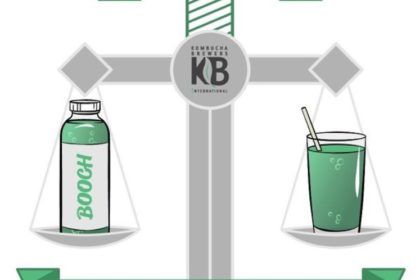
Special Note: Learn more about the new Kombucha safety and quality standards on The Fermentation Association’s Kombucha Brewers New Code of Practice Webinar (Wednesday, July 29th at 10am PT/1 pm ET). Hear from Hannah Crum, president of KBI, as she shares her insights into the Code and her experience in the years-long process to publish the standard. Register here for free.
Kombucha Brewers International (KBI) unveiled a kombucha Code of Practice this month, the first set of safety and quality standards for the industry. The goal of these guidelines is to give transparency to the consumer.
“This is about protecting kombucha as a traditional beverage,” says Hannah Crum, president of KBI. “Kombucha has to taste good and deliver on its health benefits. It has a reputation hundreds or thousands of years old. But you say the word ‘kombucha’ today and a lot of people don’t even really know what that means. We’re seeing products that don’t adhere to the spirit of kombucha.”
Crum will be addressing the new Code of Practice during a free webinar with The Fermentation Association on Wednesday, July 29.
The kombucha industry is exploding in growth. Retail data from SPINS shows kombucha sales were up 21% from 2018-2019, yielding $728.8 million in sales. But that growth has come with growing pains. Kombucha can now be found in most retail channels, sold in the refrigerated section or pasteurized in shelf-stable cans; brewed with a Symbiotic Culture of Bacteria and Yeast (SCOBY) or processed from a base; fermented with higher alcohol content or made with sweetners. These different kombucha categories have been a sticking point with kombucha brewers. Over the years, various lawsuits have plagued the industry — most brought on by other kombucha brands.
“We’re an interesting industry. We’ve had some difficult lawsuits,” Crum says. “It’s created a lot of tension, a lot of secrecy, a lot of drama. The craft beer industry doesn’t sue each other. It flies in the face of what we view the industry to be.”
The new Code of Practice makes room for all types of kombucha, but ingredients and brewing processes must be defined on the label. A seal program will certify authentic kombucha — made with tea leaves and potable water, utilizing a SCOBY and sugar or nutritive sweeteners. Additional ingredients — like flavorings, carbon dioxide, vitamins, minerals or probiotic bacteria — are only allowed if they do not exceed 20% of the finished product.
The seal certification will be granted based on standards outlined in the Code of Practice, but a third-party auditing firm will review confidential information from each brand in order to certify the product.
“What we’re struggling with, and it’s what every traditional fermented food is coming up against, kombucha doesn’t lend itself to mass production,” Crum says. “I’m a traditionalist, I’m not going to lie about it. But what I also recognize, we do not want one kind of consumer. We want a diverse range of consumers, with diverse tastes. Someone wants a zero calorie kombucha, while someone else wants a full-flavor kombucha made with SCOBY. They’re entirely different consumers.”
The Code was developed over five years, with input from various KBI members. But KBI did not apply for an official standard of identity with the Food and Drug Administration (FDA) because the trade organization wants the Code of Practice to be an evolving, flexible framework.
“That’s the benefit of being self-regulated. We don’t have the bureaucratic red tape,” Crum says. “We’re not here to walk into your facility to chide and scold you, that’s not our business. What we’re concerned about is commerce, trade, promoting the category, helping consumers get excited about kombucha, and helping them understand the category.”
